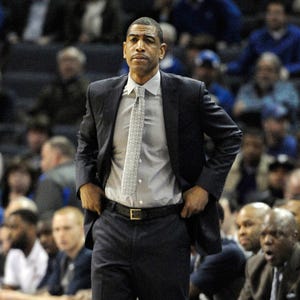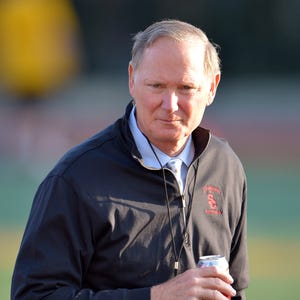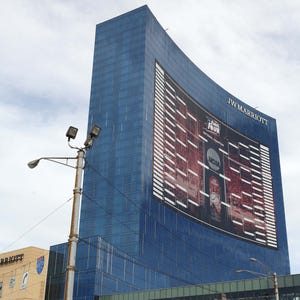How sports world is driving changes to disputed Indiana religious freedom law – USA TODAY
INDIANAPOLIS – A quote from Nelson Mandela is displayed in the office of Ryan Vaughn, president of Indiana Sports Corp. He thinks the events of the last week – with leaders of the sports world speaking out on a pending Indiana law – prove Mandela’s point that “sport has the power to change the world.”
Indiana’s general assembly is working on a “fix,” as Gov. Mike Pence styles it, to the state’s newly passed Religious Freedom Restoration Act, which critics contend is really cover for certain businesses not to serve gay and lesbian customers. Vaughn said he thinks language for the fix will be in place before this weekend’s Final Four – and that the sports commission will have some say in it.
“We don’t typically engage in public policy or legislative matters,” Vaughn told USA TODAY Sports on Wednesday. “We’re primarily focused on the execution of premier sports events. But since this so directly impacts our ability to do that, and because it is not representative of what our partners believe – their value systems – it was important for us to get heavily involved.”
The NFL, the NBA and NASCAR are among sports organizations that have issued statements supportive of the LGBT community. The NCAA, which calls Indianapolis home, said it would consider holding events elsewhere. Nike called the law “bad for society.” Coaches for the University of Connecticut, the defending NCAA men’s basketball champion, will not attend the coaches’ convention at the Final Four. And coaches of the Final Four teams issued a statement decrying discrimination of any kind.
“When you have so many sports entities speaking out, I think the weight of that becomes overwhelming,” said Cyd Zeigler, a co-founder of Outsports.com. “I’m not surprised that these organizations and companies are coming to the help of LGBT people, but I am surprised how strongly some of them are doing so.”
MORE: USA TODAY Sports coaches’ salary database
Zeigler singled out Southern California athletics director Pat Haden, who said he would support his gay son and not attend a College Football Playoff selection committee meeting in Indianapolis. “This is a school whose reputation is built on football and the athletic director is saying no,” Zeigler said. “That statement by him might be the most powerful and personal statement of them all, and really reflective of the value of sports.”
Vaughn said the sports commission is in communication with the governor and general assembly on what to do about the law, which is set to take effect July 1, and how to get a fix hammered out by Friday, before Saturday’s national semifinals.
“Language and policy alike are being discussed and debated and the appropriate fixes are being shared and we’ve been part of those conversations,” Vaughn said. “We’re happy to do that. I would be absolutely floored if there was some language presented publicly that we weren’t a part of (and) supportive of.”
Vaughn has ideas on what that language needs to convey: “We need to make it very clear – exceptionally clear – that the Religious Freedom Restoration Act can in no way be used to discriminate, or to defend discrimination, against a series of groups, anyone really. But then we need to be very specific about recognizing those groups who feel they are a potential target of this, and that includes sexual orientation and gender identity, among many others.”
GETTING INVOLVED
The website Visit Indy, run by the city’s nonprofit tourism board, carries a photo of the city skyline and these rainbow-flanked words: “All Are Welcome In Indy.” The site also includes this statement: “No legislation can take away the ethos of Indy, its ‘Hoosier Hospitality.’ Indy is built on its people, who are warm, welcoming, and inclusive of all. Visit Indy proudly joins Mayor Greg Ballard in opposing RFRA.”
Chris Gahl, Visit Indy’s vice president of marketing and communications, said it is unusual for the group to take a position on a political issue but that this one directly affects tourism. And much of Indianapolis’ tourism revolves around hosting sports events, such as the Super Bowl, Big Ten championships, this summer’s USA Gymnastics Championships – and Final Fours, the men this year and the women in 2016.
“We are a city built on sports tourism,” Gahl said. “We have hosted 500 national and international sports events here in the last 30 years.”
Hosting the events “is a big part of our business model, as a state and especially as a city,” Vaughn said. “We have a national reputation for executing these events, and sports have a big impact on us from an economic point of view.”
Visit Indy estimates the economic impact of the Final Four at a little more than $70 million. Indiana Sports Corp. estimated that Super Bowl XLVI in February 2012 had a direct economic impact of $176 million.
Derrick Gordon, an openly gay basketball player who played last season at the University of Massachusetts but is transferring, wonders if Indiana deserves such premier hosting duties.
“They don’t need to have any more big-time events (in Indiana) if it’s going to be that way,” Gordon said. “I feel bad for the people who are gay that have to live their lives out there dealing with” fallout from the law, which he said could make it more difficult for a closeted person to come out.
“You could have someone ready to do it, but that keeps them away from their freedom,” he said. “I can’t even picture myself going through something like that because I had so much support in my corner with my situation. My message for anyone in that position is to stay strong and for anyone who calls you out because of your sexuality, walk away from them and be a bigger person.”
Vaughn said he thinks the governor and members of the general assembly were genuinely caught off guard by the public reaction to the bill. Zeigler said he thinks that reaction was amplified by the governor signing the bill so soon before the Final Four.
“I think the timing of this is what catapulted the sports world into the center of it,” Zeigler said. “The country is descending on Indianapolis for these basketball games, in a state where basketball is essentially a religion.”
‘HOW GOD MADE ME’
Gordon questioned the invocation of religion in the law. “People are just using religion as a crutch, as an excuse,” he said. “I’m Christian and I’m gay. I think it’s more about how you were raised. Last time I checked, God said everyone is created equal and you shouldn’t judge. In my opinion, if I’m gay, that’s how God made me.”
Gordon will speak at a Final Four panel for the National Association of Basketball Coaches and the You Can Play Project to help educate coaches on LGBT issues. Zeigler will moderate the panel. He said he hopes coaches don’t boycott the Final Four, because they can learn valuable lessons there.
Gahl said Visit Indy has gotten emails from roughly 700 people saying they might cancel trips and heard from 10 conventions that were considering cancellations, plus one that did. Will Howe, co-owner of the Wild Beaver Saloon near the convention center, said roughly half of its business comes from conventioneers and attendees of other special events.
“I don’t think we need the law,” Howe said. “It’s taken on a life of its own and snowballed out of control. … We’re freaking out because all the downtown community, we survive on our convention center.”
Beyond the dollars, Howe said he wondered what the rest of the country would think of his state: “I worry that the few people that are in office are making people think that’s the way everyone (here) thinks.”
Phil Denton, owner of Gregs, a gay bar and dance club, is uncertain about the potential financial impact on businesses. “It certainly could,” he said. “It certainly should.”
Some businesses around town are putting up signs to suggest that the only thing discriminating about them is their tastes.
“We (heart) all wine drinkers,” says a sign at Tastings: A Wine Experience. “Everybody’s Local Watering Hole,” says a sign at The Ball & Biscuit. “We proudly serve humans,” says a sign at the Tinker Street Restaurant and Wine Bar.
And then there is this sign, found at several Indy establishments: “Instead of hate, we proudly serve everyone.”
Contributing from Indianapolis: Gerry Ahern, Nicole Auerbach, Scott Gleeson and Daniel Uthman.








